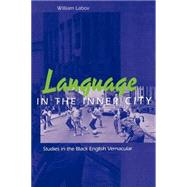Language in the Inner City
, by Labov, William- ISBN: 9780812210514 | 0812210514
- Cover: Paperback
- Copyright: 6/1/1972
With the recent controversy in the Oakland, California school district about Ebonics--or as it is referred to in sociolinguistic circles, African American Vernacular English or Black English Vernacular--much attention has been paid to the patterns of speech prevalent among African Americans in the inner city. In January 1997, at the height of the Ebonics debate, author and prominent sociolinguist William Labov testified before a Senate subcommittee that for most inner city African American children, the relation of sound to spelling is different, and more complicated than for speakers of other dialects. He suggested that it was time to apply this knowledge to the teaching of reading. The testimony harkened back to research contained in his groundbreaking bookLanguage in the Inner City, originally published in 1972. In it, Labov probed the question "Does 'Black English' exist?" and emerged with an answer that was well ahead of his time, and that remains essential to our contemporary understanding of the subject.Language in the Inner Cityfirmly establishes African American Vernacular English not simply as slang but as a well-formed set of rules of pronunciation and grammar capable of conveying complex logic and reasoning. Studying not only the normal processes of communication in the inner city but such art forms as the ritual insult and ritualized narrative, Labov confirms the Black vernacular as a separate and independent dialect of English. His analysis goes on to clarify the nature and processes of linguistic change in the context of a changing society. Perhaps even more today than two decades ago, Labov's conclusions are mandatory reading for anyone concerned with education and social change, with African American culture, and with the future of race relations in this country.






